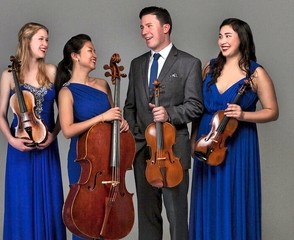|
Back
After 116 years... New York
Naumberg Bandshell, Central Park
06/29/2021 -
Richard Strauss:Sextet from Capriccio, Opus 85 [&]
Anton Bruckner: Adagio, from String Quintet in F Major, WAB112 [*]
Dimitri Shostakovich: Two Pieces for String Octet, Opus 11
Felix Mendelssohn: Octet in E Flat Major, Opus 20
Emerson String Quartet: Eugene Drucker, Philip Setzer (Violins), Lawrence Dutton (Viola) [&], Paul Watkins (Cello) [&]; Ulysses String Quartet: Christina Bouey, Rhiannon Banerdt (Violins), Colin Brookes (Viola) [*], Grace Ho (Cello)
Terrance McKnight (Compere)

Ulysses String Quartet (© Mark Holler)
“The essence of the beautiful is unity in variety.”
Felix Mendelssohn
“I sat down by a little brook, unpacked my Swiss cheese, and that darn tune popped into my head!”
Anton Bruckner
What? Has it only been 116 years since Central Park’s free concert series started here?? Like Joseph Papp’s “Shakespeare In The Park” the Naumberg concerts started–and continues–to bring New Yorkers who ordinarily wouldn’t dream of Shakespeare or Mozart for evenings of both. Glorious performers (this year, Gil Shaham, the Knights, the Emerson String Quartet) along with younger virtuosi.
The elegiac atmosphere of the outdoors, the murmurations of birds, interviews with the artists...
True, the only disturbances in 1905 were the clip-clop of horses. Today one suffers the insufferable obligati of helicopters. Otherwise the opening night audience last night seemed entranced–and a very unusual entrancement–by a blending of the six-year-old Ulysses Quartet and the four-decade-old Emerson Quartet.
Why unusual? When one thinks of the Naumberg Concerts, one thinks of Rossini overtures, Verdi operas, a Tchaikovsky 1812 or a Gershwin mélange. All worthy and all...well, predictable.
Presumably, during the pandemic, the organisers were either high or intoxicated. “Hey,” would say one, “let’s get the audience frightened by Anton Bruckner. Not a whole symphony, but the very slow movement of his String Quintet.”
This would continue with “And then some Strauss. Not Til Eulenspiegel but the equally slow string sextet from Capriccio. His last some. And after that a slow movement from Shostakovich.”
Figuring that would be fine for a music journalist or two, they scheduled the great (and hardly draggy) Mendelssohn Octet.
The two groups together were lithe, energetic and striking for the Shostakovich. Even the opening adagio has a “surprise symphony” middle. But had any audience drifted off for the Bruckner and Strauss, they would have been jolted by the fearless early Shostakovich molto allegro, played with endless good spirits by the group.
The opening Strauss Sextet really needed an introduction from WQXR’s Terance McKnight. This was not chamber music; this was a valedictory, a hale and farewell from the composer, a melange of Classical and Romantic. It is a very moving work, and the addition of Emerson’s viola and cello gave it the pure atmosphere with it deserved.
Hearing Bruckner’s Adagio from his only chamber music was hardly a respite for the full-bandstand audience. This, though, did need the deft maturity of the Emersons, with Ulysses viola. It is a thickly woven work, enigmatic, sometimes touching. A shame it had to follow the equally enigmatic Richard Strauss (the more jocular Shostakovich would have offered a fitting reprieve), but the sounds–unfortunately counterpointed with the helicopters–were sufficient.
After these works, Mendelssohn’s Octet was a joy of youth. After all, he wrote it at the sage of 16. Added to that, an Emerson player noted how elegant, faultless was Mendessohn’s notation.
Unsaid was the sloppy crossed-out ink-splattered notation of Ludwig van Beethoven. Draw your own conclusion.
It was a wondrous, if idiosyncratic performance. The accents were doubly accented, the scherzo and final presto were whirligigs. And as a finale to a difficult concert, Mendelssohn’s Octet glowed under the sky like a dream on a midsummer night.
Harry Rolnick
|